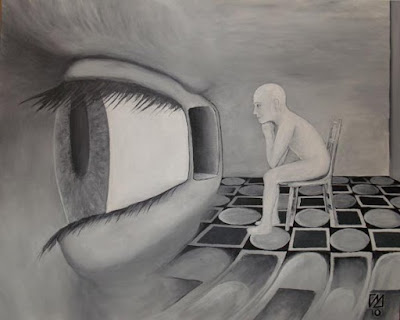 I'm already sleep-deprived, but if I take out the medication block, will tomorrow morning build my tower higher -- or destroy it? And which block should I choose -- the pill that frequently doesn't work, or the one that reliably works too well? Now I overslept; should I knock out the breakfast block in order to make it on time to work? Of course it would be safer to sacrifice the doing-my-hair-and-makeup block... except that my looks are the only part of my tower that is still relatively stable. Can I really bear to poke holes in the entire thing? Do I really want to build a tower to the sky if that tower is entirely frail?
I'm already sleep-deprived, but if I take out the medication block, will tomorrow morning build my tower higher -- or destroy it? And which block should I choose -- the pill that frequently doesn't work, or the one that reliably works too well? Now I overslept; should I knock out the breakfast block in order to make it on time to work? Of course it would be safer to sacrifice the doing-my-hair-and-makeup block... except that my looks are the only part of my tower that is still relatively stable. Can I really bear to poke holes in the entire thing? Do I really want to build a tower to the sky if that tower is entirely frail?Should I pull out the block of dignity and reach out to a friend during a flashback? It might build the tower of friendship, but will that friendship go toppling over when I really need them? And which side should I pull from -- the old friends who are probably tired of dealing with my same old issues, or the new friends who might be weirded out? What can I afford? What is going to get the best ROI?
Do I pull the block of stability out of my current living arrangement (renting a cheap room) and place it on the tower of mental clarity that the peace of my own place would afford me? Because the last two times I tried that, it came crashing down and I had to start over. Do I work thirty hours just to get benefits, even though it would be healthier for me to work about twenty? Do I push it to forty and sacrifice the block of health to build the career tower? Because just about every time I've tried that, it all comes tumbling down. No matter what I choose, I'm in a precarious position and my life is perpetually on the verge of ruin...
I used to be a believer in Spoon Theory, but I think this "Jenga Theory" is rather more accurate for me. Spoon Theory does a good job at showing how there are never enough resources, but Spoon Theory doesn't depict the risks involved with choosing one spoon over another, nor the consequences of making the wrong choice. My life coping strategy is similar to my survival strategy when I was in graduate school: Eat on Mon/Wed/Fri, sleep on Tue/Thu/Sat, breathe on Sunday. I try to balance what I'm sacrificing so that it's not always the same area suffering. But something always suffers, always.







